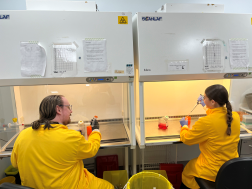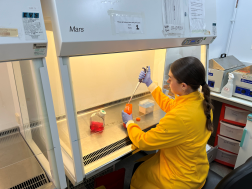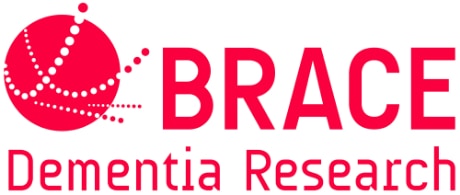


Dr Jeff Davies
Pilot Project: Swansea University, 2022
Exploring the role of the “hunger hormone” in dementia.
Summary
Dr Jeff Davies and his research team are researching a hormone called ghrelin which plays a role in the immune system in the brain. They believe that the relationship between ghrelin and the immune system could be a new treatment target for dementia.
What do we already know?
A person’s diet is known to be an important factor for their health. Eating fewer calories, known as calorie restriction, has even been found to benefit brain function and reduce the risk of age-related brain diseases such as dementia. A stomach hormone called ghrelin is increased during calorie restriction and has been found to be responsible for some of the beneficial effects. Identifying how this works may reveal new ways to treat diseases such as Alzheimer’s disease (AD), and Parkinson’s disease (PD).
There are two main types of ghrelin, which impact brain function. Acylated ghrelin is the protective form and has been found to increase the generation of new nerve cells and combat inflammation in the brain. Unacylated ghrelin has the opposite effect and counters the positive effects of acylated ghrelin. They found that in patients with Parkinson’s disease dementia, levels of the unacylated ghrelin are increased. They think that this might cause the cognitive decline seen in many types of dementia.
What is this project trying to find out?
Dr Jeff Davies and his team are now evaluating if the ghrelin pathway could be targeted for a new potential treatment. They will treat immune cells collected from patients with many types of dementia with acylated ghrelin and unacylated ghrelin. They want to see the effect of these types of ghrelin on inflammation in the brain. They will also treat these immune cells with a medication that mimics acylated ghrelin to see if this could be used as a treatment option for the cognitive decline seen in dementia.
What has been achieved so far?
So far, Dr Jeff Davies and his team have developed drug-like molecules that increase the positive effects of acylated ghrelin. They are now treating immune cells collected from dementia patients with these drug-like molecules and monitoring the effects to see if this pathway could be used for future dementia treatment.
Why is this important?
This research will provide important information about the potential of targeting ghrelin when treating dementia. If successful, this opens the door for a different treatment option for those with dementia which could slow or even prevent the disease progression.
Share this page
